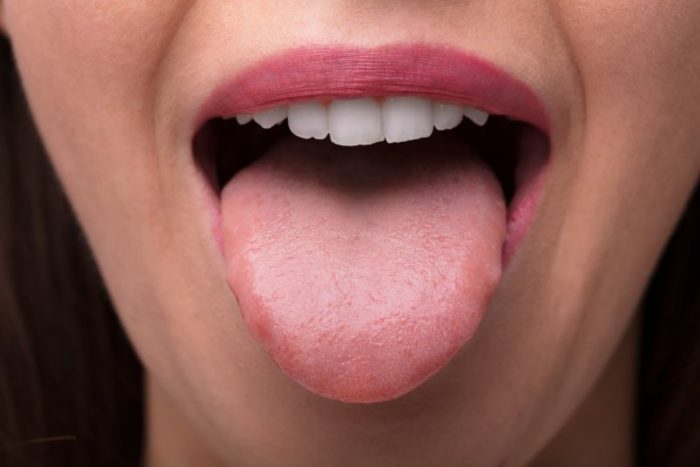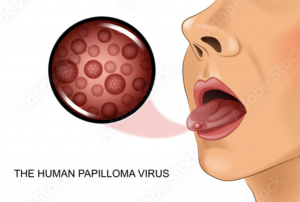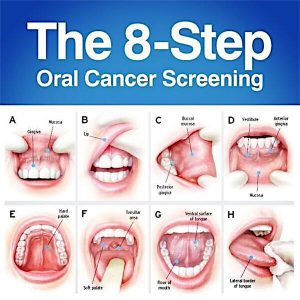
Flesh-colored bumps known as warts are the result of the human papillomavirus (HPV). These growths can appear on various parts of the body, such as the hands or genital area. They are also contagious and can spread from person to person. As warts spread from one part of the body to another, it’s possible to develop them on the tongue. Oral HPV is a very prevalent condition, affecting about 7 percent of the U.S. population, according to the Centers for Disease Control and Prevention (CDC).
Warts on the Tongue
Tongue warts could be caused by different strains of HPV.
These include:
- Squamous papilloma – These lesions have a white appearance that look like cauliflower. HPV strains 6 and 11 are responsible for this type of wart.
- Verruca vulgaris (the common wart) – The location of these warts are diverse and may include the entire body. The causative strains are HPV 2 and 4.
- Focal epithelial hyperplasia – Doctors refer to this condition as Heck’s disease. The HPV strains associated with focal epithelial hyperplasia are 13 and 32.
- Condyloma acuminata – We usually find these lesions in the genital area. The causative strains are HPV 2, 6, and 11.
Causes of Warts on the Tongue
Tongue warts are a potential health concern that may develop due to certain behaviors or factors. If you engage in oral sex with a partner who has genital warts, you may develop tongue warts as a result. Furthermore, open-mouth kissing with someone who has oral HPV can also spread the virus and potentially lead to tongue warts.
Another potential way to develop tongue warts is by touching a wart with your hand and then putting that part of your hand in your mouth. This is particularly true if you bite your nails, as you could introduce the wart virus from your fingers to the mouth.
Additionally, having a weakened immune system or having a cut on the tongue may also increase your risk of developing warts.
Treatment Options for HPV Tongue Warts
While some warts may disappear on their own over time, others can take months or even years. Tongue warts are generally harmless; however, they can still cause pain, especially if they are large.
Cryotherapy is an option. This is a procedure that involves freezing off the abnormal tissue using cold liquid nitrogen. Electrosurgery, on the other hand, utilizes an electric current to seamlessly cut through the warts. These HPV treatments are effective for all sorts of warts, including the ones that develop on the tongue.
It’s essential to note that HPV can spread through close skin-on-skin contact, regardless of whether warts are present or not. The only bullet-proof plan to prevent HPV and genital warts is to refrain from all sexual contact. Of course, this is not practical, so communication with your partner and doctor is crucial.
Things to Consider About HPV Tongue Warts
Tongue warts are contagious. Therefore, it is necessary to take measures to protect yourself.
Here are some do’s and don’ts to follow:
- Do get the HPV vaccine – The vaccine protects against HPV and genital warts and prevents the spread of warts to the mouth during oral sex. The CDC recommends the vaccine for children and adults between the ages of 11 and 26. Moreover, adults up to the age of 45 can also receive the vaccine.
- Don’t engage in oral sex or open-mouth kissing if you or your partner has a wart on the tongue.
- Share your status – Inform your partner about your HPV status and ask them to do the same.
- Don’t touch or pick at a wart on your tongue.
- Quit smoking – Research found that the risk of oral HPV 16 is higher in individuals who use tobacco products.
It is a common misconception that HPV can only be transmitted during an outbreak. Some strains of HPV may cause warts, while others may not have any symptoms. What’s more, HPV may be present in semen, so it is advisable to use a condom during sex.
Diagnosis of Tongue Warts
When you notice a bump on your tongue, you might immediately think of a wart. However, not every bump is a wart. Other possible causes of bumps or lesions on the tongue include a canker sore, which is a harmless sore that can form on the tongue or gums. Furthermore, lesions on the tongue could result from an injury, lie bumps, cysts, or syphilis.
For this reason, make sure to see a dentist or dermatologist if you notice any unusual bumps or lesions in your mouth to receive a proper diagnosis.
HPV and Oral Cancer
According to the American Cancer Society, HPV 16 and 18 increase the risk of cancer. The Oral Cancer Foundation also notes that HPV 16 is strongly associated with oropharyngeal cancer, which is cancer in the tissue of the throat or esophagus. However, only about 1% of people have this type of HPV, as estimated by the CDC.
Oral cancers caused by HPV are different from those caused by smoking. HPV virus converts normal cells into cancerous cells while smoking damages cells in the mouth and throat, leading to the development of cancerous cells.
Although having HPV doesn’t mean you’ll get cancer, it’s crucial to notify your doctor if you experience any symptoms, such as:
- Persistent sore throat
- A lump or swelling in the mouth
- Unexplained hoarseness
- Dysphagia (i.e., difficulty swallowing)
It’s worth noting that a wart on the tongue typically doesn’t require treatment and may resolve on its own. However, it could take years. Similarly, an HPV infection can clear up without complications for most people within two years.
The Takeaway
If you notice any unusual bumps or lesions in your mouth, it’s important to seek medical attention. Additionally, you need to take precautions to prevent HPV, such as getting vaccinated and practicing safe sex.
If you’re concerned about your risk of HPV or cancer, talk to your doctor for more information and guidance.










